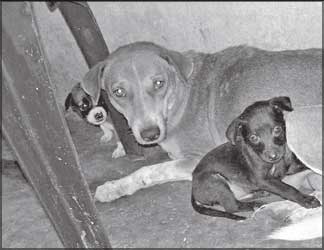National dog sterilization programme in CP - some questions
Champa FERNANDO
As an animal welfare group that introduced humane dog handling and
early-age neutering to Sri Lanka and provided a model to initiate the
national dog sterilization programme and worked for more than a decade
hand in hand with the Health Ministry, supporting its rabies control
programme conceptually as well as financially in order to bring about a
humane rabies control programme to eradicate rabies from Sri Lanka, it
is indeed sad to see the mauling up of new born stray/ownerless pups and
their lactating mothers in the Central Province by some contract vets
who were awarded the sterilizations, despite the Central Province
Governor's directive to them not to sterilize new born stray pups or
lactating strays.
Apart from the accepted veterinary practices that were taught to
these vets at the Vet Faculty of the University of Peradeniya, it is
also the President's humane vision that is being compromised by them.
Ownerless pups
On October 5 these vets, who are paid per surgery by the government,
sterilized a set of less than three-week old ownerless pups and their
lactating mother and on November 17, just 10 days after the Governor's
directive to desist from such sterilizations, they sterilized two 4-5
week old pups and several lactating mothers who have been rendered
ownerless since September 26, as their sole owner, a woman, had died on
that day.
|

Stray dogs |
When the second set of puppies and lactating mothers were sterilized
by these vets, another animal welfare organization in Kandy, SOFA, was
already looking after the welfare of these animals, some of whom had
been pregnant when they first saw the dogs on September 26, and were
going to have them sterilized, leaving out the pups and the mothers for
later.
Nowhere in the world are new born pups or their mothers sterilized.
And no discerning vet would cut up animals so indiscriminately. It is
also sad and ironical that this carnage is taking place in Kandy and
Central Province, in the very precincts of the Dalada Maligawa, a place
of Buddhist worship of the highest order and a place from which people
and the country alike get their blessings.
Government funds
We have written to the Health Ministry that it is a waste of
government funds to sterilize stray/ownerless pups of less than three
months, as more than 90 percent of these pups do not survive for more
than a month or two after birth. Most do not reach the re-productive
stage. Even under the best care and after de-worming and sometimes
vaccination against parvo and distemper by animal welfarists/lovers,
still large numbers of puppies that are born as strays die.
Instead of sterilizing stray/ownerless pups, they should be
vaccinated against rabies as recommended in a study by Dr. Panduka
Gunawradene et al. (Should Puppies under Three Months of Age be
Vaccinated Against Rabies? P.18, Annual Scientific Sessions of the Sri
Lanka Veterinary Association, May 7, 2010.)
The study recommends that pups under three months of age should be
vaccinated owing to the inadequacy of the maternal antibody levels to
protect the pups from rabies. The study further recommends a booster
vaccination at three months of age to increase the pups' RVNA (rabies
virus neutralizing antibody) titres.
Vaccination programme
So it makes sense that stray/ownerless pups and lactating mothers be
first given the ARV under the ministry's dog rabies vaccination
programme. The surviving animals can be sterilized thereafter when they
are three or four months old. The argument that these animals are
potential rabies carriers and therefore should be sterilized does not
hold water and is being put forward purely in order to use these hapless
animals as fodder to earn money.
Payments made to these vets to sterilize animals that have perhaps
less than 5 percent chance of surviving and 0 percent of an immediate
contribution to the dog population is a waste of precious public funds.
By stopping sterilization of stray/ownerless pups of less than three
months and instead having them vaccinated against rabies, the ministry,
on the one hand, will be able to arrest transmission of rabies
conforming to its dog rabies control programme as well as save a
considerable amount of money spent on sterilization of non-productive
animals that will anyway die from natural causes before they reach the
productive stage, and on the other can eliminate the dehumanizing
elements of its essentially humane dog population control programme,
initiated to accommodate the no-kill policy on dogs proclaimed by the
President.?
The writer is the Secretary, KACPAW (Kandy Association for
Community Protection through Animal Welfare) |



